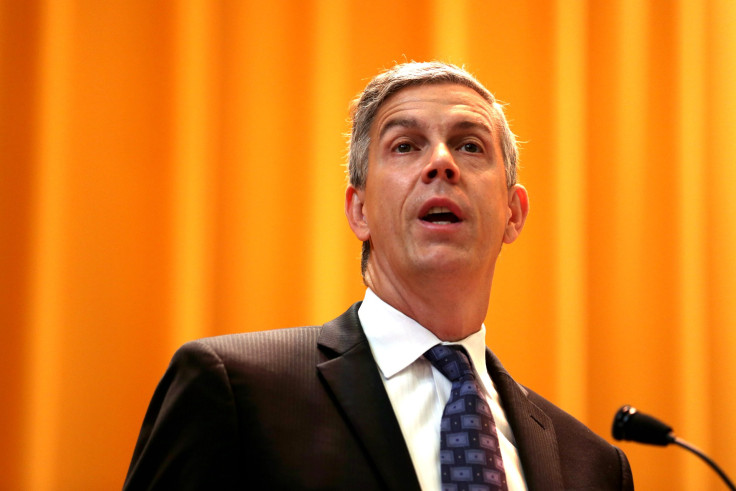Debt-Free College Plans 'One Part Of Fight' To Improve Higher Education: Arne Duncan

Debt-free college plans have good intentions, but they're only part of a broader fix to improve students' access to and performance in higher education, according to the White House. In a speech Monday at the University of Maryland, Baltimore County, Education Secretary Arne Duncan praised politicians' efforts to lower the cost of college while also calling for more focus on accountability, the Washington Post reported.
“There is a path to a higher education system that serves many more students much better. And continuing to make college more accessible and affordable – including more tuition-free and debt-free degrees – is part of that. But it’s only part," Duncan said, according to his prepared remarks. “If we confine the discussion to cost and debt, we will have failed. Because we will have only found better ways to pay for a system that fails far too many of our students."
College costs and student debt have been rising for years. For the 2014-2015 academic year, annual tuition and fees for students attending public schools in their home states totaled $18,943, which is about three times what people paid 30 years ago, USA Today reported. Today's average student graduates with about $35,000 in loans.
As such, college affordability and access were already shaping up to be central issues in the 2016 general election. In January, President Barack Obama debuted a plan to give two tuition-free years of community college to anyone willing to work for it, and legislation supporting it was introduced in both chambers of Congress earlier this month. Democratic candidates Martin O'Malley and Bernie Sanders have each put forth debt-free college proposals as part of their presidential campaigns, and Hillary Clinton's was said to be coming.
"We cannot limit the discission on college access to affordability" @arneduncan pic.twitter.com/IIWePJMXXp
— White House Af-Am Ed (@AfAmEducation) July 27, 2015Duncan said the leaders were right to question the cost of degrees, but "the degree students truly can’t afford is the one they don’t complete, or that employers don’t value." He wanted to see legislators shift their focus to student success and hold underperforming schools responsible.
That was part of the goal of Obama's college ratings system, which proved controversial and was ultimately abandoned last month. After running into issues and complaints about how to measure diverse colleges on a single scale, the White House announced it would instead create a school comparison tool for students and families.
"When students win, everyone wins," Duncan said Monday. "But when they lose, every part of the system should share responsibility."
© Copyright IBTimes 2025. All rights reserved.






















